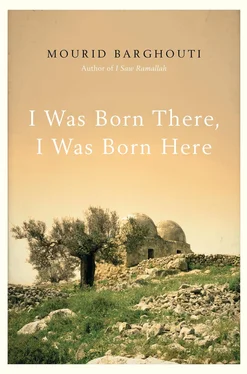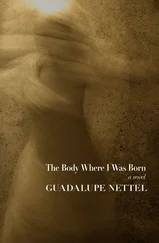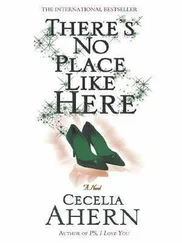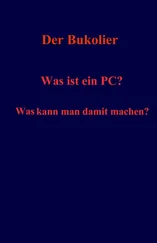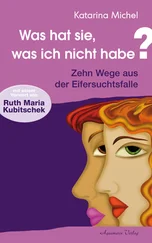Anis comes to pick us up in his car.
He doesn’t keep us waiting long. He’s our cousin and is regarded with affection by the whole family. We suggest Tamim sit in the front next to Anis so that he can see as much as possible of the road, and I sit next to Husam and Ya‘qoub in the back. Ya‘qoub is the grandson of Abu Hazim — a talented boy who is studying the qanun, or Arab zither, and memorizes popular songs, some of which he sings to us.
We set off northward, in the direction of Deir Ghassanah.
Anis and Husam keep up a constant stream of anecdotes about the family and we laugh the whole way.
Anis keeps busy telling Tamim about the villages and places that we pass:
“This is Surda” (the Surda checkpoint hasn’t been set up yet).
“This is the leper colony.”
“This is Birzeit University.”
“The street on your right goes to Kobar.”
“Soon we’ll be at the ‘Atara checkpoint.”
“Get your IDs ready.”
ID cards in hand, we arrive at the checkpoint.
The first Israeli soldier doesn’t stop us. He is clearly an Ethiopian Jew belonging to the Falasha, whose exit from Ethiopia was arranged by Israel several years ago in connivance with Ja‘far al-Nimeiry, then president of Sudan. The second soldier, a European Jew who looks like a film star, waves us through without checking or asking any questions; in fact, he seems to me to smile at us as he waves his hand. We are delighted, because the ‘Atara checkpoint is the only one between Ramallah and Deir Ghassanah, meaning that from here on our way is clear. I think to myself that Tamim is lucky.
Husam says, “Your road is blessed, Tamim. Everything will be straightforward from now on, God willing. If ‘Atara’s ‘moving,’ everything’s fine.”
Anis says with confidence, “They know my car. That’s why they didn’t stop you.”
“It has red number plates too, meaning it’s a government car, a car belonging to the Authority,” says Ya‘qoub.
“Are they such good friends with the Authority?” asks Tamim.
Anis answers, “Not friends, but they look out for us. One of the benefits of Oslo, of which your dad doesn’t approve.”
“They look out for you because you look out for them.”
“What’s wrong with that?”
“That’s not how the homeland is supposed to relate to the Occupation.”
“I suggest we continue this discussion, Mr. Mourid, the day we bring you an independent state. I don’t know what you’ll have to say then.”
“I’ll say to you then what the poet Ilya Abu Madi said.”
“What’s that?”
“He said ‘I know not.’”
Anis laughs. He understands from this sarcastic answer that I wish to put an end to political discussion.
Our cousin Anis is a good-hearted Fatah activist, with a clean conscience and clean hands. He has never sought to benefit from his friendship with Yassir Arafat or his heartfelt defense of him and of the Fatah leadership at all times, though it would be easy for him to do so. We used to tell him that his support for the Fatah leadership was ‘romantic.’ Then we raised it to ‘Sufi-like.’ Then we raised again it to ‘a matter of faith.’ Then we raised it to ‘blind.’ He never allows anyone to criticize Fatah in general or Arafat in particular in his presence. We continue on our way, exchanging funny family stories and laughing all the time, as though on a weekend picnic.
Anis resumes his commentary: “On your left is the settlement of Halamish. Every day they add a building, so now it stretches all the way to the hill next to it. After that is the village of Beit Rima. Then … the capital.”
He means, of course, the capital of the Barghoutis, Deir Ghassanah. No Barghouti misses an opportunity to talk, with pride naturally, of the family and of Deir Ghassanah. They are indifferent to the jokes about this boasting told by other families.
After the Bank was occupied in 1967, people started making predictions, some pessimistic, some optimistic, about when the Israelis would withdraw. Someone said, “I’m sure Israel will withdraw after a year.”
His friend, who was from the Husseini family, responded, “What rot! How can Israel withdraw from the Bank after a year? The Barghoutis have been here for five hundred years and they still haven’t withdrawn!”
Ironically, no sooner has Anis finished speaking than he stops the car and turns off the engine in obedience to an order from an Israeli woman soldier and her male companion, who clearly are guarding the main gateway to the settlement.
“Where are you going?” asks the female soldier in American English.
“To Deir Ghassanah,” answers Anis.
“Get out of the car, please.”
“Excuse me?”
“Get out of the car.”
Anis gets out.
“License.”
Tamim understands that Uncle Anis is in some kind of difficulty and wants to find out what, so he opens the car door and asks, with an innocence incomprehensible in Halamish, “What’s up, Uncle Anis?” Immediately he finds the female soldier’s machine gun aimed at him. “Stay where you are! Close the door!” she yells in his face.
I think it’s very odd for them to ask for his driver’s license and wonder if her English isn’t that good and she meant to say ‘ID card.’
Anis, even more taken aback than I, asks her, also in American English, “Which license?”
“Your license and the registration.”
Anis hands her the registration and starts searching for his driver’s license in his small wallet, where he doesn’t find it, and then in his pockets, where he doesn’t find it either.
The tension on the female soldier’s face is plain. She orders us all out of the car and the male soldier immediately joins her, his finger on the trigger of his rifle. He talks with his comrade in Hebrew, asking what the problem is. She tells him and backs away a little so he can get closer.
“You are in violation of the law and under arrest. We shall take you to Bet-El for interrogation and you will be punished. Understood?”
“I’m the undersecretary of the Ministry of Planning in the Palestinian Authority. This is my identity card.”
Anis takes out his ID and the male soldier takes and keeps it.
Anis goes on: “I left the license at home by mistake. I live here in Deir Ghassanah, so I can bring it to you in ten minutes.”
The male soldier exchanges some words in Hebrew with his female companion.
“You are in violation of the law.”
“What’s the driver’s license got to do with you? Are you a traffic policeman? Only the Palestinian traffic police can punish me, which it will have the right to do. This is what the agreement between us says.”
“I don’t know anything about agreements. Screw agreements. Here the only law is the law of the State of Israel, understand?”
It appears Anis has thought of another way out and tries it, on the off chance. He starts going through the papers in his wallet. Then he pulls something out.
“Also I have U.S. nationality. I’m a U.S. citizen and this is my U.S. social security number. Do you stop U.S. citizens?”
“You are in violation of Israeli law. I want the license. Don’t you understand?”
Then the soldier starts yelling at the top of his voice in a hectoring, didactic tone: “This is the State of Israel, understand? You are driving a car in the State of Israel.”
The female conscript raises her gun and the male soldier starts yelling even louder. “You are driving your car in the State of Israel.”
His voice rises even higher.
“You have to respect the law of the State of Israel! Understand?”
“We are not in the State of Israel here. Also, I’m an undersecretary and not a child driving without a license. I’ll bring you the license in ten minutes and.… ”
Читать дальше
